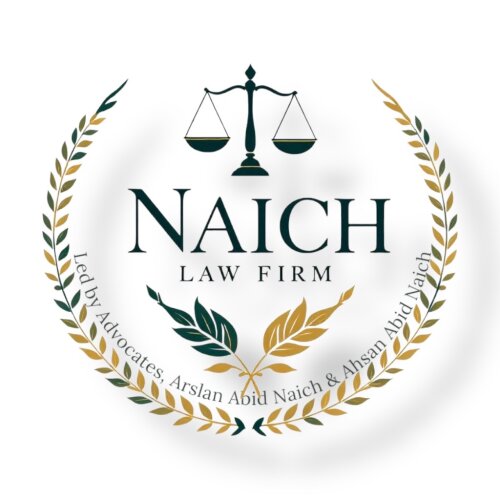Best Nursing Home Abuse Lawyers in Karachi
Share your needs with us, get contacted by law firms.
Free. Takes 2 min.
List of the best lawyers in Karachi, Pakistan
About Nursing Home Abuse Law in Karachi, Pakistan
Nursing Home Abuse refers to any form of mistreatment, neglect, or harm experienced by elderly residents in nursing homes or care facilities. In Karachi, Pakistan, there are laws in place to protect the rights of these vulnerable individuals and hold the responsible parties accountable.
Why You May Need a Lawyer
Engaging the services of a lawyer is crucial in situations involving nursing home abuse. A lawyer can guide you through the complex legal processes, provide valuable advice, and ensure your rights are protected. Some common situations where a lawyer's assistance may be required include:
- Physical abuse and assault
- Neglect or inadequate care
- Financial exploitation
- Medical malpractice
- Violations of the resident's rights
Local Laws Overview
In Karachi, Pakistan, the following are key aspects of local laws relevant to nursing home abuse:
- The Sindh Protection of Elders Act, 2016, provides legal protection to elderly citizens and safeguards their rights in nursing homes and care facilities.
- Under this act, nursing homes are required to ensure proper care, adequate nutrition, and medical attention to their residents.
- Any form of abuse, neglect, or mistreatment is strictly prohibited and can lead to legal consequences.
- Elderly individuals have the right to dignity, security, and quality care, and their consent must be obtained before any medical treatment or procedure.
Frequently Asked Questions
Q: What actions can be classified as nursing home abuse?
A: Nursing home abuse includes physical abuse, emotional abuse, neglect, financial exploitation, sexual assault, and medical malpractice committed against elderly residents in nursing homes.
Q: Who can be held liable for nursing home abuse?
A: Parties that can be held liable for nursing home abuse include the facility management, staff members directly involved in the abuse, and even third-party contractors or individuals who contribute to the abuse or neglect.
Q: How can I recognize signs of nursing home abuse?
A: Signs of nursing home abuse may include unexplained injuries, poor personal hygiene, sudden weight loss, emotional withdrawal, depressive behavior, frequent arguments or conflicts with staff, and financial irregularities.
Q: What should I do if I suspect nursing home abuse?
A: If you suspect nursing home abuse, you should gather as much evidence as possible, document any visible injuries or signs of neglect, report the situation to the facility management, and contact a lawyer experienced in nursing home abuse cases for legal guidance.
Q: How long do I have to file a nursing home abuse lawsuit?
A: The time limit for filing a nursing home abuse lawsuit can vary. It is advisable to consult with a lawyer promptly to understand the specific statute of limitations applicable to your case.
Additional Resources
For further assistance and information regarding nursing home abuse, consider reaching out to the following resources in Karachi, Pakistan:
- Ageing Concerns Helpline: +92-XXXXXXXX
- Social Welfare Department, Government of Sindh: http://sindh.gov.pk/dpt/SocialWelfare
- Association for the Rights of Elderly: http://www.are.org.pk
Next Steps
If you believe you or a loved one has been a victim of nursing home abuse in Karachi, Pakistan, it is important to take action. Follow these steps:
- Gather evidence, including photographs, medical records, and eyewitness accounts.
- Report the abuse to the management of the nursing home and document their response.
- Consult with a lawyer experienced in nursing home abuse cases to understand your legal options.
- File a complaint with the relevant regulatory authorities, if necessary.
- Work closely with your lawyer to gather additional evidence and pursue a legal course of action.
Lawzana helps you find the best lawyers and law firms in Karachi through a curated and pre-screened list of qualified legal professionals. Our platform offers rankings and detailed profiles of attorneys and law firms, allowing you to compare based on practice areas, including Nursing Home Abuse, experience, and client feedback.
Each profile includes a description of the firm's areas of practice, client reviews, team members and partners, year of establishment, spoken languages, office locations, contact information, social media presence, and any published articles or resources. Most firms on our platform speak English and are experienced in both local and international legal matters.
Get a quote from top-rated law firms in Karachi, Pakistan — quickly, securely, and without unnecessary hassle.
Disclaimer:
The information provided on this page is for general informational purposes only and does not constitute legal advice. While we strive to ensure the accuracy and relevance of the content, legal information may change over time, and interpretations of the law can vary. You should always consult with a qualified legal professional for advice specific to your situation.
We disclaim all liability for actions taken or not taken based on the content of this page. If you believe any information is incorrect or outdated, please contact us, and we will review and update it where appropriate.











